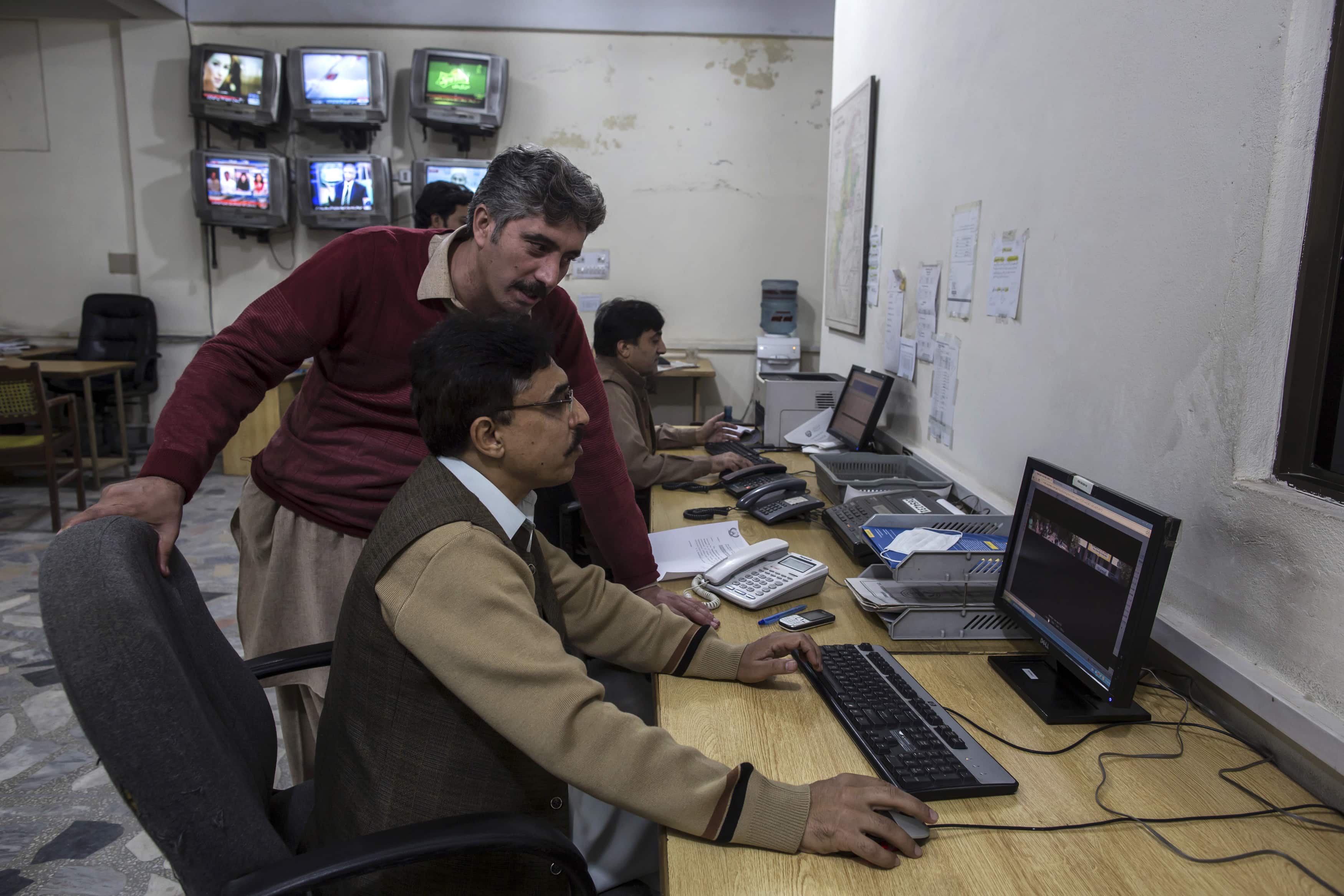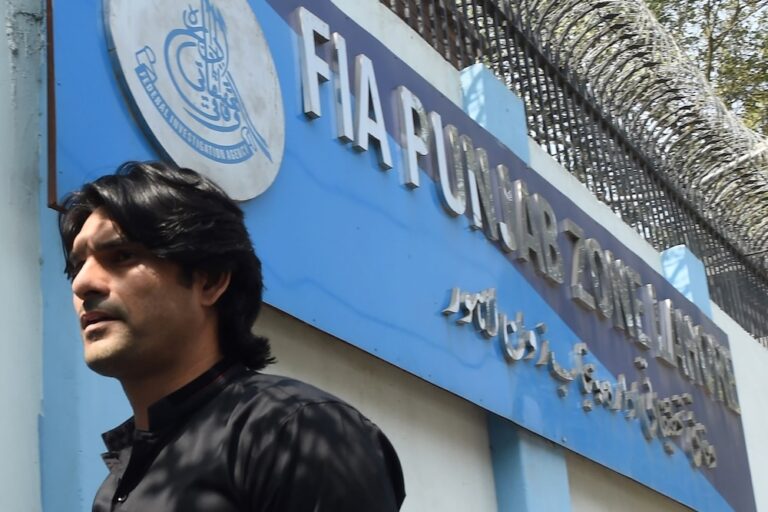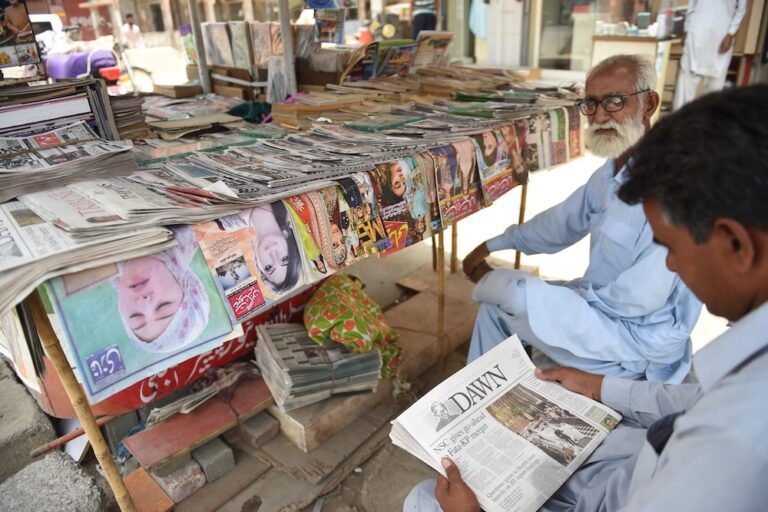In addition to the alarming but now familiar threats from militant groups, law enforcement agencies and political parties and groups, the Pakistani media became bitterly divided following the attempted murder of Hamid Mir, a popular television host of Geo News.
This statement was originally published on pakistanpressfoundation.org on 31 December 2014.
2014 has been one of the most difficult years for Pakistani media. In addition to the alarming but now familiar threats from militant groups, law enforcement agencies and political parties and groups, the Pakistani media became bitterly divided following the attempted murder of Hamid Mir, a popular television host of Geo News, Pakistan’s most viewed televisions channel.
2014 again saw media professionals paying a heavy price in blood for keeping Pakistani citizens informed in an increasingly polarized and violence wrecked country. Eight media personnel, including three journalists were killed during the year. At least thirty-five media practitioners were injured during 2014.
The murderous attack on Hamid Mir on April 19 and the ensuing tension between Geo-Jang group and Inter-Services Intelligence (ISI) and military on the other, has resulted in the severe setbacks for the Pakistani media.
The unprecedented reversals in media freedoms include divisions between media organisations, which isolated the Geo-Jang media group. The ensuing propaganda [conflict] between Geo and rival media groups badly tarnished the image of the media among the public.
Having isolated the Geo-Jang group, the distribution of the group’s newspapers and of television channels was disrupted to an extent not previously seen in the history of the country. In order seek a closure to the episode, the government rather clumsily through the Pakistan Electronic Media Regulatory Authority (PEMRA) suspended the Geo Group for a period of 15 days.
The bickering between media groups overshadowed the terrible toll of life that included the fatal shooting of Shan Dahar, reporter of Abb Takk TV channel on the night of December 31 in Badh, in Larkana district of Sindh province of Pakistan. He was shot in the back and was taken to the hospital where he remained unattended until he succumbed to his injuries in the early hours of January 1. The same month on January 17 there was a targeted attack on the DSNG van of Express Television channel that killed three media workers. In March the driver of television anchor Raza Rumi was killed in a shooting on his car. Later in the year on August 28 unidentified assailants barged into the offices offices of Online news agency in Quetta, the capital of the restive Balochistan province, and murdered Irshad Mustoi, Bureau Chief, Abdul Rasool Khajjak, reporter, and accountant Muhammad Younas.
The largest number of injuries occurred on August 31 when 28 journalists, cameramen and other media workers were injured during clashes between police and the protest demonstration led by the opposition Pakistan Tehrik Insaf (PTI) and Pakistan Awami Tehrik (PTI).
The next day on September 1, protestors belonging to PTI and PAT attacked the offices of the state owned Pakistan Television (PTV). They took over the control room and broadcasts of PTV were disrupted for a few hours.
Perhaps the only silver lining in all this could be the realization among the media of the need to develop effective codes of conduct to promote a more ethical working environment and for effective mechanisms to resolve complaints against the media. There is also a greater realization among media organizations of the need to cooperate with civil society and political groups to arrest the dramatic deterioration in freedom of expression and the media safety situation in Pakistan.
On the positive side, the killers of a Pakistani journalist were convicted by the criminal justice system of Pakistan when on Saturday March 1, 2014 a Pakistani court convicted six defendants for their roles in the murder of Wali Khan Babar, a Geo TV journalist who was shot dead in Karachi in January 2011.
KILLINGS OF MEDIA WORKERS
Seven media workers including three journalists were killed in the line of duty in 2014. One of them, Shan Dahar, worked in Sindh province while two others, Irshad Mastoi and Abdul Rasool Khajjak, were from Baluchistan.
Journalist shot dead in Sindh
Shan Dahar, reporter of Abb Takk TV channel, was shot on the night of December 31 in Badh, in Larkana district of Sindh province of Pakistan. He was shot in the back and was taken to the hospital where he remained unattended until he succumbed to his injuries in the early hours of January 1. He was survived by two young daughters.
Despite compelling evidence pointing to the cause of his killing being his reporting on the use of fake medicines in local government hospitals, the police report declared his death as accidental.The flawed police report could sabotage any hope for a proper investigation and prosecution for the assailants and the government needs to formally order a credible reinvestigation of the attack.
There is also need for public release of the reports of the medical committees to investigate any possible criminal negligence by the hospital where Dahar lay unattended despite frantic pleas by his sisters for medical staff to go to the hospital to treat his life threatening wounds.
To mark World Press Freedom Day, the Pakistan Press Foundation conferred the 2014 PPF Press Freedom Award on Shan Dahar.



